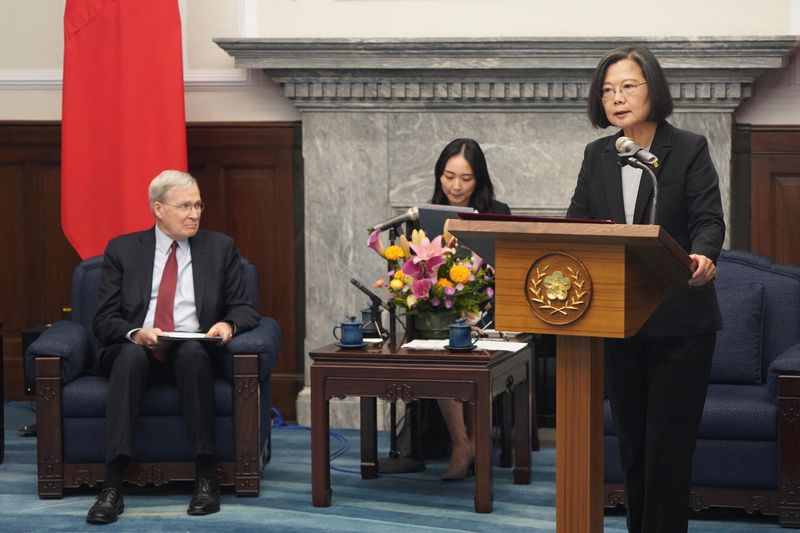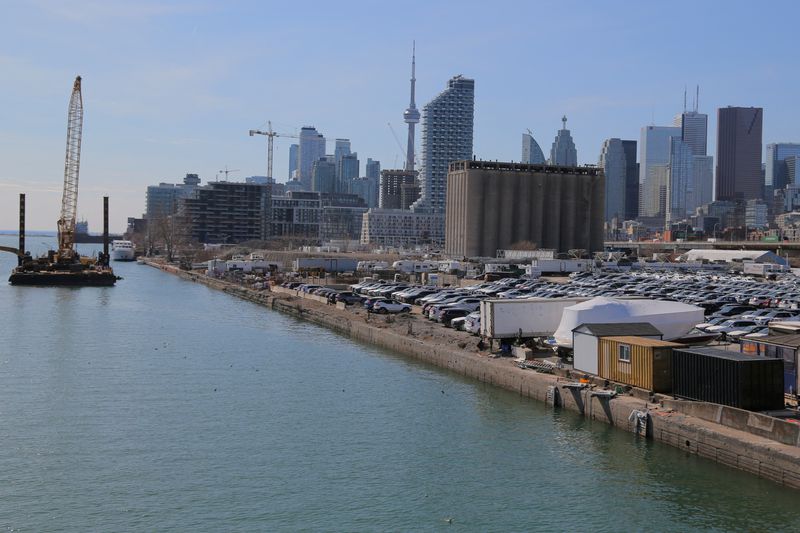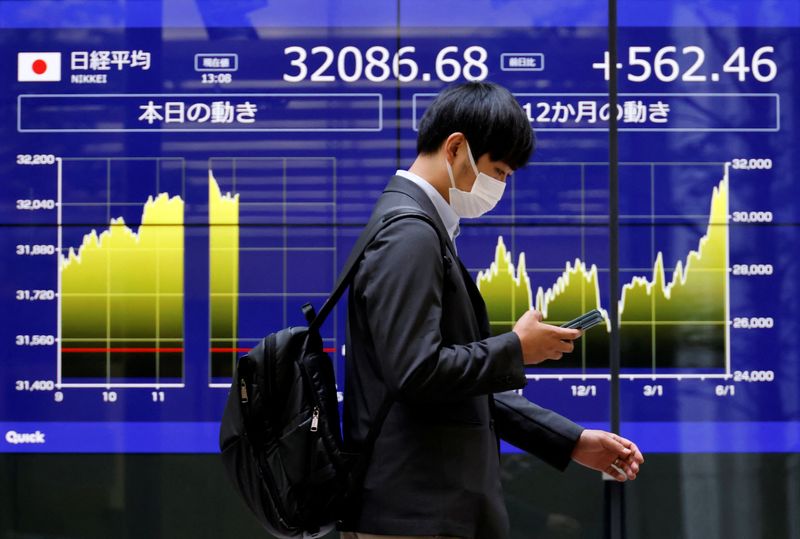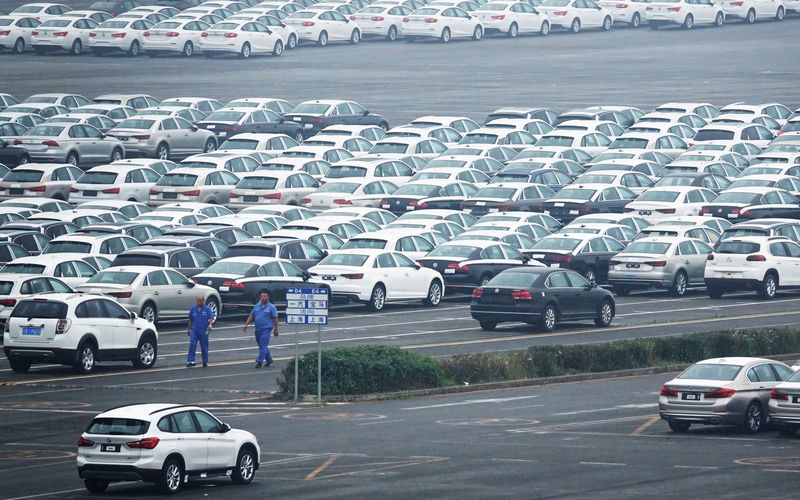Select Language

By Ben Blanchard and Fabian Hamacher
TAIPEI (Reuters) -The United States looks forward to continuity in the Taiwan-U.S. relationship under the new Taiwanese administration and the U.S. commitment to the island is "rock solid", a former senior U.S. official told Taiwan President Tsai Ing-wen on Monday.
Lai Ching-te from Taiwan's ruling Democratic Progressive Party (DPP) won the presidential election on Saturday as expected and will take office on May 20.
In a show of support for the government, a senior administration official said last week that President Joe Biden planned to send an unofficial delegation to the Chinese-claimed island. Taiwan's government rejects Beijing's sovereignty claims.
The Biden administration has feared that the election, transition and new administration would escalate tensions with Beijing, which has pressured Taiwan militarily and economically to assert its sovereignty claims.
Meeting Tsai at the presidential office, former U.S. National Security Advisor Stephen Hadley said he was there to convey from the American people congratulations on the election.
"Taiwan's democracy has set a shining example to the world," Hadley said, in comments released by Tsai's office.
"We are honoured to have the opportunity to meet with you today to reaffirm that the American commitment to Taiwan is rock solid, principled and bipartisan and that the United States stands with its friends," he added.
Hadley said he looked forward to meeting Lai and other political leaders.
"We look forward to continuity in the relationship between Taiwan and the United States under the new administration, and for common efforts to preserve cross-strait peace and stability."
China, which has never renounced the use of force to bring Taiwan under its control, has criticised several countries for congratulating Lai on his election victory, saying they should not interfere in China's affairs.
Taiwan's government says Beijing has no right to speak for the island's people or represent them on the world stage.
The United States is Taiwan's most important international backer, despite the lack of formal diplomatic ties, and a major arms supplier to Taipei.
On Saturday following the election, U.S. President Joe Biden said the United States does not support the independence of Taiwan.
Lai says he does not seek to change the status quo across the Taiwan Strait, sticking by Tsai's long-standing policy of neither seeking independence nor union with China and that only Taiwan's people can decide their future.
Tsai told the U.S. delegation, which also includes former Deputy Secretary of State James Steinberg, that their visit fully demonstrates U.S. support for Taiwan's democracy and highlights their "staunch" partnership.
"We hope that Taiwan-U.S. relations continue to advance and serve as a key driving force in regional and global prosperity and development," he said.
While Lai won election, albeit with less than half the vote, the DPP lost its majority in parliament, potentially making it much harder for him to pass legislation.
Taiwan's stock market on Monday largely brushed off any post-election uncertainty, with the benchmark index up around 0.5%.

By Rod Nickel
WINNIPEG, Manitoba (Reuters) - Canada is considering a cap on the number of international students allowed to live in Canada, Immigration Minister Marc Miller said according to a CTV report, as the government faces criticism for a housing affordability crisis.
Canada depends on immigration to drive its economy and support an aging population and Prime Minister Justin Trudeau has been ramping up annual immigration. The housing crisis has been blamed on an increase in migrants and international students fueling demand for homes just as inflation has slowed construction.
Miller said in a taped interview with CTV Question Period that the Liberal government is considering a cap on international students in the first and second quarters this year.
"That volume is disconcerting," Miller is quoted by CTV as saying, referring to the number of international students in Canada. "It's really a system that has gotten out of control."
He did not say how much of a reduction in international students the government is considering.
Miller's spokesperson could not be immediately reached.
Official data show there were more than 800,000 foreign students with active visas in 2022, up from 275,000 in 2012.
The interview with Miller is scheduled to air on Sunday.
Canada is a popular destination for international students since it is relatively easy to obtain a work permit.
The Liberal government floated the idea of capping the number of foreign student visas in August, but Housing Minister Sean Fraser said then that the government had not yet made a decision of whether to pursue that option.
Miller said he planned to discuss the problem with provincial counterparts.
Trudeau's Liberals have seen their popularity plummet after more than eight years in office, with polls placing them well behind the official opposition Conservatives led by Pierre Poilievre, who have criticized the government for not properly managing the housing issue.

Investing.com -- Retail sales data and bank earnings will be the highlight of a holiday shortened week as markets await more insights on the health of U.S. consumers. Global leaders gather in Davos, China is to release full year GDP figures and oil prices look set to remain volatile. Here’s what you need to know to start your week.
U.S. retail sales
Wednesday’s U.S retail sales data will be closely watched for indications that consumer spending - a major driver of economic growth - is remaining resilient in the face of elevated interest rates.
The Federal Reserve hiked rates last year in a bid to tame inflation. But with price increases slowing, the potential pace of interest rate cuts this year, and whether the economy will avoid a recession, are the key questions hanging over markets.
Retail sales are expected to have risen 0.4% in December, after a 0.3% increase in November.
Data on housing starts and existing home sales are expected to point to a housing market that’s still struggling in the face of higher borrowing costs.
Investors will also have the chance to hear from several Fed officials including Fed Governor Christoper Waller as well as Atlanta Fed President Raphael Bostic and San Francisco Fed head Mary Daly.
Bank earnings
Bank earnings are set to continue with Goldman Sachs (NYSE:GS) and Charles Schwab (NYSE:SCHW) due to report on Tuesday and Wednesday respectively, after a mixed bag of earnings from big lenders on Friday.
Major U.S. banks reported lower profits in a choppy fourth quarter clouded by special charges and job cuts, with signs an income boost from high interest rates is waning and some consumer loans are starting to sour.
Still, the country's largest lenders JPMorgan (NYSE:JPM), Wells Fargo (NYSE:WFC), Bank of America (NYSE:BAC), and Citigroup (NYSE:C) struck an upbeat tone on the economy, noting that consumers remained resilient even as defaults on consumer loans began returning to pre-pandemic levels.
Jamie Dimon, CEO of JPMorgan Chase, the biggest U.S. bank and a bellwether for the economy, said consumers were still spending and that the markets were expecting a soft landing, but warned government spending could continue to push prices higher.
Davos
The 54th annual World Economic Forum titled “Rebuilding Trust,” gets underway on Monday in the Swiss ski resort of Davos.
Political figures, central bankers and business leaders will discuss a challenging global economic outlook, with wars in Ukraine and Gaza, trade concerns and rising debt levels all on the agenda.
China’s Premier Li Qiang and French President Emmanuel Macron, the only G7 leader attending Davos, are both due to give special addresses.
European Central Bank President Christine Lagarde is scheduled to make three appearances. International Monetary Fund Managing Director Kristalina Georgieva, World Bank President Ajay S. Banga, and World Trade Organization Director-General Ngozi Okonjo-Iweala will also be in attendance.
China GDP
China is to release full-year GDP figures on Wednesday which will show how close the world’s second-largest economy got to realizing the official 5% growth target for 2023.
A protracted property crisis, cautious consumers and geopolitical challenges are also pointing to another bumpy year ahead for China’s economy.
Elsewhere, Germany is to release full year GDP data on Monday which could show that the Eurozone’s largest economy suffered a shallow recession in 2023.
The UK is to release what will be closely watched inflation data on Wednesday, a day after the latest employment data. Underlying inflation is expected to remain well above the Bank of England’s 2% target.
The BoE has said it plans to keep interest rates high "for an extended period" to ensure the surge in inflation does not cause long-term problems in the economy, but investors are betting on a first rate cut as soon as May.
Oil prices
Oil prices look set to remain volatile in the week ahead after rising 1% on Friday as an increasing number of oil tankers diverted course from the Red Sea following strikes by the U.S. and Britain on Houthi targets in Yemen after attacks on shipping by the Iran-backed group.
For the week, Brent was down 0.5% and U.S. crude 1.1% lower. Earlier in the week, sharp price cuts by top exporter Saudi Arabia and a surprise build in U.S. crude stockpiles spurred supply worries.
Although the lack of shipping through the Red Sea... does create transportation issues for some crude supplies, the impact on the physical oil markets is, thus far, minimal," Matt Stephani, president at investment advisory firm Cavanal Hill Investment Management told Reuters.
"If the conflict were to spread to the other side of the Arabian peninsula... oil markets may react much more significantly," Stephani added.
--Reuters contributed to this report

(Reuters) - The United States and Britain launched strikes from the air and sea against Houthi military targets in Yemen in response to the movement's attacks on ships in the Red Sea, a dramatic escalation of the Israel-Hamas war in Gaza.
Oil climbed [MKTS/GLOB] and stock markets tensed on the news.
Comments from investors and analysts:
KHOON GOH, HEAD OF ASIA RESEARCH, ANZ, SINGAPORE
"I think at this stage, it's difficult to predict. Whilst the attacks have already seen disruptions and diversions of shipping and that has already caused quite a sharp jump in shipping freight rates just in the last few weeks, if this strike is able to...resolve the issue and shipping lanes can be secured again and things normalise, then that'll be positive as we'll see a normalisation of freight rates.
"I think the concern is that if this starts to escalate... which will cause a potential spike up in oil price in particular, and further disruptions in shipping lanes.
"Markets are taking a wait-and-see approach for the time being, hence we're not seeing too much of a reaction. If we see a massive escalation of the situation...then the traditional flight-to-safety will see U.S. Treasuries, safe-haven currencies like yen and Swiss franc benefit."
SHANE OLIVER, CHIEF ECONOMIST, AMP (OTC:AMLTF), SYDNEY
"The U.S. and UK launching air strikes on Houthis in Yemen is adding to the risk of Iran being directly drawn into the conflict which would threaten oil supplies.
"The creeping widening in the Israel/Hamas conflict poses a risk to global growth and inflation, for example Houthi attacks on Red Sea shipping adding to transport costs as ships have to go around Africa.
"A weaker patch is often evident into February or March after seasonal strength from October. While we expect shares to provide reasonable returns this year, they are likely to be more constrained and vulnerable than last year and worries about delays in rate cuts, recession and geopolitics could drive a deeper first half pullback than seen last year."
ROB CARNELL, ASIA-PACIFIC HEAD OF RESEARCH, ING, SINGAPORE
"When we got in this morning after what was fairly disappointing U.S. inflation data, you'd have expected bond yields to spike higher on that. In fact, they did the opposite. That's probably a reaction to what's been happening in the Middle East with the U.S., UK air strikes on the Houthis. There will be a shift back towards risk aversion. This hasn't fully blossomed out into a proper risk-off mode.
"I think people are looking for a little bit of safety at the moment. Possibly, also, coming ahead of this weekend's Taiwan election, most people are just thinking 'maybe I want to take a little bit of risk off the table', and that's maybe a factor as well. So I think the bond market's probably the clearest indication of where things are going."

By Joe Cash, Ellen Zhang and Liangping Gao
BEIJING (Reuters) -China's exports grew at a faster pace in December, while deflationary pressures persisted last month, keeping alive expectations for more policy easing measures to shore up an economy carrying significant pockets of weakness into 2024.
Chinese policymakers could breathe a sigh of relief on signs global trade is slowly turning a corner with the prospect of lower borrowing costs on the horizon, but a protracted property crisis, cautious consumers and geopolitical challenges point to another bumpy year for the world's second-biggest economy.
Exports grew 2.3% from a year earlier in December, customs data showed on Friday, compared with a 0.5% increase in November and beating the 1.7% boost expected in a Reuters poll. Imports grew by 0.2% year-on-year, missing forecasts for a 0.3% increase but still reversing a 0.6% drop a month prior.
"The better export data is first and foremost driven by semiconductors and electronics, and the recovery on that side comes from a cyclical rebound in consumer demand overseas," said Xu Tianchen, senior economist at the Economist Intelligence Unit.
Xu said the figure was also buoyed by a low statistical base since "there was severe disruption to exports last December following China's abrupt reopening."
Still, the improved Chinese export data last month joins those from South Korea, Germany and Taiwan in suggesting global trade is starting to mount a comeback, after higher interest rates in the United States and Europe crimped demand over 2023.
Last year, China's exports fell for the first time since 2016.
The United Nations has warned of a likely contraction in goods trade by $2 trillion or 8% in 2023.
South Korea's exports, a closely watched indicator of global trade, rose for a third month in December, while the latest German export data for November surprised on the upside.
Analysts also anticipate that interest rates will drop at least 1.5 percentage points in the United States and Europe this year, which should improve demand for imported goods.
And yet, consumer prices in China fell for a third month in December while factory-gate prices extended a more-than-year-long decline, separate data from the National Bureau of Statistics showed, highlighting the persistence of deflationary forces in the Asian giant's economy.
The consumer price index rose 0.2% in 2023, the slowest pace since 2009, and full-year producer price index fell 3.0%, marking the steepest downturn since 2015.
"The deflationary pressure in China's economy remains as domestic demand is still weak. The property sector continues to weigh on the economy," said Zhiwei Zhang, chief economist at Pinpoint Asset Management.
Analysts expect more policy support measures over the short term to spur demand.
"Consumption will likely pick up into the Lunar New Year, but more stimulus is needed to boost household spending and eliminate deflationary pressure," UBS analysts said in a note.
Chinese policymakers also will have to contend with underpowered overseas economies, with the World Bank on Tuesday warning that global growth is set to slow for a third year in a row.
"New foreign orders for Chinese producers increased significantly last month, but it's not a long-term trend," said Dan Wang, chief economist at Hang Seng Bank China.
Market reaction to the data was largely muted. China's blue chip CSI300 stock index fell 0.17%, while Hong Kong's Hang Seng Index stayed steady, as did the yuan against the dollar.
FRAGILE DEMAND PROSPECTS
The world's biggest energy consumer bought in record levels of coal and crude oil over 2023, as demand recovered form a pandemic-induced slump despite the economic headwinds. Iron ore imports also enjoyed a record-breaking year.
And soybean imports jumped for the first time in three years, as Chinese traders ramped up purchases, particularly from Brazil, to take advantage of cheaper beans from a bumper crop there.
But iron ore futures slipped on Friday, off the back of the CPI and PPI data, which pointed to soft demand prospects and dented investor sentiment.
Julian Evans-Pritchard, head of China Economics at Capital Economics, said he expected import volumes to improve in the near-term thanks to further policy support boosting demand for commodities.
"The ongoing cyclical recovery in economic activity will underpin a slight rise in core inflation," he said in a note.
"That said, weak global growth and continued overinvestment in China means that deflation risks will continue to hang over its economy for some time."
Most analysts say the uptick in exports will provide only a modest boost to domestic demand.
"Exports improved on the margin... but exports as a pillar for growth in China are not strong enough to boost overall domestic demand," Pinpoint Asset Management's Zhang said.

By Stella Qiu
SYDNEY (Reuters) -Asian shares were cautious on Friday as the escalating conflict in the Red Sea region sent oil prices surging, while slightly higher-than-expected U.S. inflation data did not dent investors' views on early and aggressive rate cuts in the U.S. and Europe.
The rally in rates may have been helped by dovish comments from European Central Bank (ECB) President Christine Lagarde who said rate cuts would occur if the central bank has certainty that inflation had fallen to the 2% level.
Oil climbed after the United States and Britain said they have started carrying out strikes against targets linked to Houthis in Yemen, after the Iran-backed group attacked international ships in the Red Sea. Brent futures jumped 2.2% to $79.11 a barrel, while U.S. West Texas Intermediate (WTI) crude rose 2.3% to $73.69.
The intensifying conflict in the Red Sea has kept shares subdued. MSCI's broadest index of Asia-Pacific shares outside Japan edged 0.2% higher, and Japan's Nikkei gained 1.1% to another 34-year high, boosted by a weak yen.
Chinese inflation data showed the country's economic recovery remained weak in December, with the consumer price index falling 0.3% from a year ago. However, separate trade data showed exports rose at a faster than expected clip last month while imports returned to growth.
Chinese shares wavered between losses and gains. Both China's blue chips and Hong Kong's Hang Seng index were last down 0.1%.
Overnight, Wall Street reversed earlier declines and was mostly flat on the day after data showed U.S. consumer prices rose more than expected in December, with a closely watched core measure coming in slightly above consensus.
Andrew Lilley, chief rates strategist at Barrenjoey, said that even though the core U.S. inflation data came in a little stronger than expected, it does not suggest a strong read on PCE, which is the Fed's preferred gauge of inflation.
"Additionally to that, the Fed speakers that we had last night all sounded incrementally more dovish than they had previously and ... we didn't hear such a strong pushback on the idea of a March cut from everybody who spoke," he added.
Fed officials took few fresh signals from the inflation data, with Richmond Fed President Thomas Barkin saying it did little to clarify the path of inflation.
Chicago Fed President Austan Goolsbee said he was not sure if the data indicated enough progress for the Fed to start cutting rates, while Cleveland Fed President Loretta Mester said a March rate cut was "too early in my estimation".
Still futures added to the bets on an interest rate cut in March at a 73% probability, compared with 68% a day earlier. They are also pricing in around 150 basis points (bps) of easing this year, compared with the Federal Reserve's dot plot of 75 bps.
"Lagarde has also similarly been pushing back against the (rate cut) idea ... So as soon as Lagarde changes her tune, and last night she did change her tune, the market is starting to move the timing of those cuts forward," said Lilley.
Euribor money market futures added as much as 10 basis points overnight. Swaps have moved to fully price in a quarter-point rate cut in April, with a 30% chance of an outsized 50 bps cut, while a total of 148 bps in easing has been priced in for this year. .
Treasuries were steady in Asia after the rally, led by the short end of the curve. The two-year yield was at 4.2618% in Asia, having fallen 11 bps points overnight, while the 10 year was little changed at 3.9715%, after easing 5 bps overnight.
In the foreign exchange market, the dollar failed to make any headway from the slightly firmer-than-expected U.S. inflation data. The dollar index was little changed at 102.19 against its major peers, after ending the previous session slightly lower. [FRX/]
Spot gold rose 0.3% to $2,035.00 an ounce.

SEOUL (Reuters) - South Korea's financial authorities will step up monitoring of real estate projects, the finance ministry said in a statement on Friday.
There are lingering concerns over real estate projects, although financial markets have been stable since builder Taeyoung's Dec. 28 announcement to reschedule its debt, it said, after the minister's meeting with chiefs of the central bank and regulatory agencies.
The meeting was held after Taeyoung's creditors agreed in the early morning to proceed with restructuring the builder's debt.

By Hernan Nessi
BUENOS AIRES (Reuters) - Argentina's annual inflation rate ended 2023 at 211.4%, the highest since the early 1990s, official data showed on Thursday, propeling the embattled South American country's year rise in prices above Venezuela for the first time in decades.
Argentina's monthly inflation also hit 25.5% in December, below forecasts, after a sharp devaluation of the local peso by the new government of libertarian President Javier Milei, who came into office last month pledging to fix the economic crisis.
The inflation data, the first involving a period since Milei took office on Dec. 10, underscores the huge challenge his government faces, despite sealing a key agreement with the International Monetary Fund (IMF) this week. Milei has warned of hyperinflation without major reforms to stall prices.
Argentina's regional peer Venezuela, long the Latin American country with the highest inflation rate, has seen prices cool in recent months, with its annual 2023 inflation rate estimated around 193% after out-of-control hyperinflation in recent years.

BEIJING (Reuters) - China's 2023 vehicle sales rose 12% year-on-year to 30.1 million vehicles, the China Association of Automobile Manufacturers (CAAM) said on Thursday.
Vehicle sales in December including exports jumped 23.5% on the year, CAAM said.

BANGKOK (Reuters) - Thai consumer confidence rose in December, reaching the highest level in 46 months, boosted by government measures to ease living costs and increased tourism, a survey showed on Thursday.
The consumer index of the University of the Thai Chamber of Commerce increased to 62.0 in December from 60.9 the previous month, the university said in a statement.
Consumer confidence rose for the fifth straight month, suggesting consumer confidence should continue to increase, particularly if the government can quickly boost the economy this year with its planned policies, the university said.
The government is forging ahead its controversial digital wallet handout programme, which involves a 500 billion baht ($14.3 billion) plan to transfer 10,000 baht ($286) to 50 million people to spend within six months.
Prime Minister Srettha Thavisin this week also urged the central bank to cut interest rates, saying high borrowing costs were hurting Southeast Asia's second-largest economy, small businesses and lower-income people.
The government wants to boost economic growth to at least 5% each year, with 2023's growth forecast at about 2.4%.
($1 = 35.02 baht)

